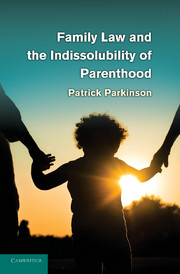Book contents
- Frontmatter
- Contents
- Preface
- PART ONE Family Law and the Meaning of Divorce
- PART TWO Parenthood in the Enduring Family
- PART THREE Parents Forever?
- 6 Violence, Abuse, and Postseparation Parenting
- 7 Relocation
- PART FOUR The Family Law System and the Enduring Family
- PART FIVE Financial Transfers in the Enduring Family
- PART SIX The Future of Family Law
- Index
- References
7 - Relocation
Published online by Cambridge University Press: 01 March 2011
- Frontmatter
- Contents
- Preface
- PART ONE Family Law and the Meaning of Divorce
- PART TWO Parenthood in the Enduring Family
- PART THREE Parents Forever?
- 6 Violence, Abuse, and Postseparation Parenting
- 7 Relocation
- PART FOUR The Family Law System and the Enduring Family
- PART FIVE Financial Transfers in the Enduring Family
- PART SIX The Future of Family Law
- Index
- References
Summary
Relocation cases are the San Andreas Fault of family law, because they involve a fundamental clash between two competing ideas about postseparation family life, one in which the family is seen to be at an end, ushering in a freedom for people to begin a new life for themselves, and the other in which the family is seen to endure beyond separation.
THE DILEMMA OF RELOCATION
Relocation cases, or “mobility” or “moving away” cases as they are sometimes known in North America, are among the most difficult cases that family courts have to deal with. A New York court wrote in a leading case that relocation cases “present some of the knottiest and most disturbing problems that our courts are called upon to resolve.”
Relocation is a commonplace event in the aftermath of separation. Indeed for many parents, it is likely to be a necessity. As a result of the property settlement, the matrimonial home may have to be sold, and one or both parents will need to gravitate to areas of lower housing costs. In the big cities, these areas are often on the perimeter of the city or beyond, leading to the creation of some distance between the parents' homes. Separation has a centrifugal effect on many parents in terms of where each can afford to live after separation. Moves of residence may necessitate practical changes to preexisting arrangements for contact between the nonresident parent and the child.
- Type
- Chapter
- Information
- Family Law and the Indissolubility of Parenthood , pp. 150 - 180Publisher: Cambridge University PressPrint publication year: 2011



